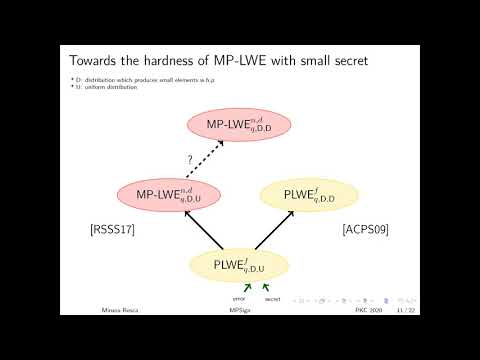Welcome to the resource topic for 2020/198
Title:
MPSign: A Signature from Small-Secret Middle-Product Learning with Errors
Authors: Shi Bai, Dipayan Das, Ryo Hiromasa, Miruna Rosca, Amin Sakzad, Damien Stehlé, Ron Steinfeld, Zhenfei Zhang
Abstract:We describe a digital signature scheme MPSign, whose security relies on the conjectured hardness of the Polynomial Learning With Errors problem (PLWE) for at least one defining polynomial within an exponential-size family (as a function of the security parameter). The proposed signature scheme follows the Fiat-Shamir framework and can be viewed as the Learning With Errors counterpart of the signature scheme described by Lyubashevsky at Asiacrypt 2016, whose security relies on the conjectured hardness of the Polynomial Short Integer Solution (PSIS) problem for at least one defining polynomial within an exponential-size family. As opposed to the latter, MPSign enjoys a security proof from PLWE that is tight in the quantum-access random oracle model. The main ingredient is a reduction from PLWE for an arbitrary defining polynomial among exponentially many, to a variant of the Middle-Product Learning with Errors problem (MPLWE) that allows for secrets that are small compared to the working modulus. We present concrete parameters for MPSign using such small secrets, and show that they lead to significant savings in signature length over Lyubashevsky’s Asiacrypt 2016 scheme (which uses larger secrets) at typical security levels. As an additional small contribution, and in contrast to MPSign (or MPLWE), we present an efficient key-recovery attack against Lyubashevsky’s scheme (or the inhomogeneous PSIS problem), when it is used with sufficiently small secrets, showing the necessity of a lower bound on secret size for the security of that scheme.
ePrint: https://eprint.iacr.org/2020/198
Talk: https://www.youtube.com/watch?v=zZikVy-tanQ
Slides: https://iacr.org/submit/files/slides/2020/pkc/pkc2020/263/slides.pdf
See all topics related to this paper.
Feel free to post resources that are related to this paper below.
Example resources include: implementations, explanation materials, talks, slides, links to previous discussions on other websites.
For more information, see the rules for Resource Topics .
